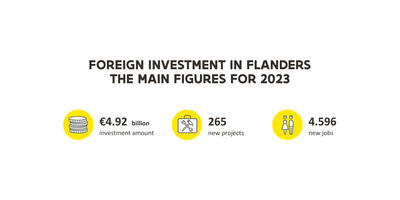
How imec (Flanders) became the prototype for R&D ecosystems

Humble yet ambitious beginnings
Back in 1984, imec was established as a non-profit spin-off of KU Leuven, Flanders’ oldest and Europe’s most innovative university. Initially backed by a EUR 62-million investment from Flanders’ regional government, it has since become one of the main independent nanotech and semiconductor research centers worldwide.
The story of imec began when 70 researchers from KU Leuven in Flanders set out to launch a microelectronics ‘superlab' and propel a chip-based industrial revolution. We needed to invest in advanced equipment, which would have been difficult for the university to do on its own.
Government support from square one
The government of Flanders’ decision to support imec – and R&D and innovation in general – was part of a strategic choice at the time. So much so that “generous funding” and a “clear vision” from Flanders’ government are highlighted by fDi Intelligence as being “the catalyst” for imec’s foundation.
In the 1980s, a local ‘third industrial revolution' policy in Flanders aimed to boost the region's knowledge base and potential to innovate, with a particular focus on the renewal of local industrial ecosystems in new materials and microelectronics.
Back then, public funding made up the vast majority of imec’s budget. But the choice to back the research center remains a no-brainer for the government of Flanders. Today, regional government support accounts for around 15% of imec’s budget.
An ecosystem of public, private and academic excellence
Another factor contributing to imec’s success is the central role it plays at the heart of a multidisciplinary ecosystem – an approach for fostering growth and innovation actively promoted by the government of Flanders. Add to that imec’s close ties to the vast talent pool at KU Leuven and other universities in the region, and it quickly becomes clear why the research center continues to thrive in Flanders.
Imec is the prototype of European brilliance: global-class talent planted its seeds in Leuven, creating a platform for academics, industry players and local policymakers to join forces and innovate. Locations across Europe have repeatedly tweaked this ‘triple helix' approach, setting the foundation for some of the continent's most consequential, albeit often unsung, stories of economic development success.
At the same time, imec’s business and financing model enables the research center to remain a neutral provider of R&D services in the semiconductor industry, a geopolitically relevant sector that is otherwise intensely competitive.
While imec maintains close working relationships with local universities and professors, its independent hierarchical management structure is crucial to its success. If you want to cater for broad framework contracts with global leaders such as Intel, Samsung, Philips or ASML, you need a top-down organization with a clear direction.
Further unraveling the recipe for success
Want to discover more about how Flanders supports pioneering research, business and ideas in some of the most advanced niche domains?
Check out all the details on R&D and innovation in Flanders or browse through our micro- and nanotech industry overview.


